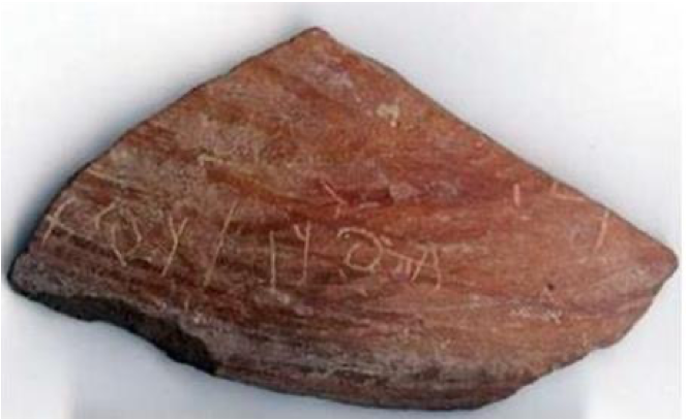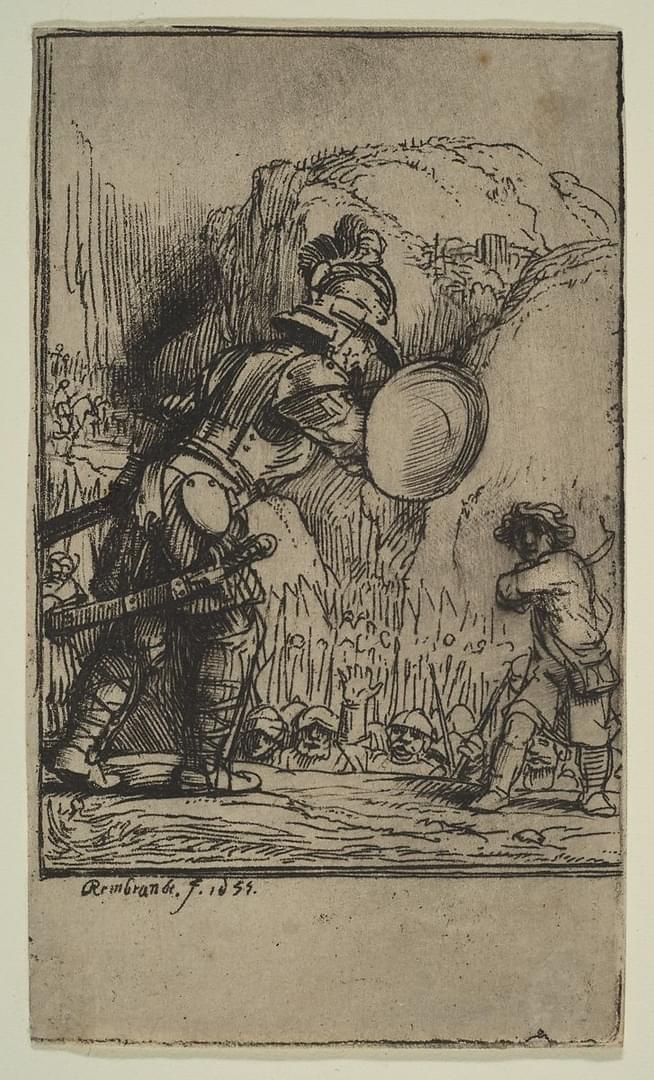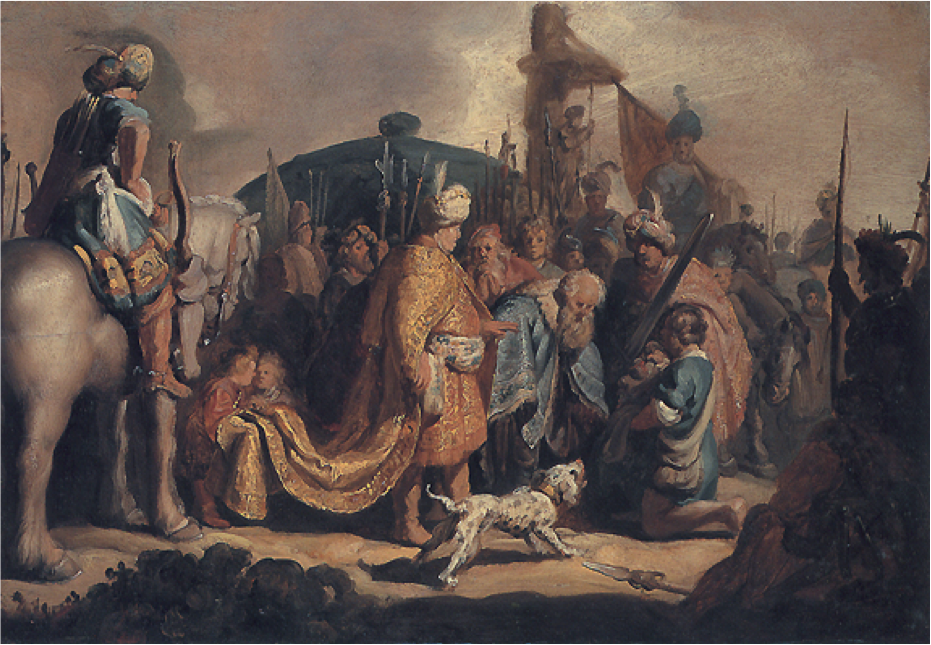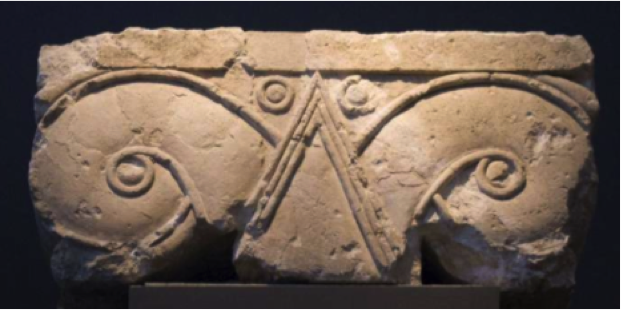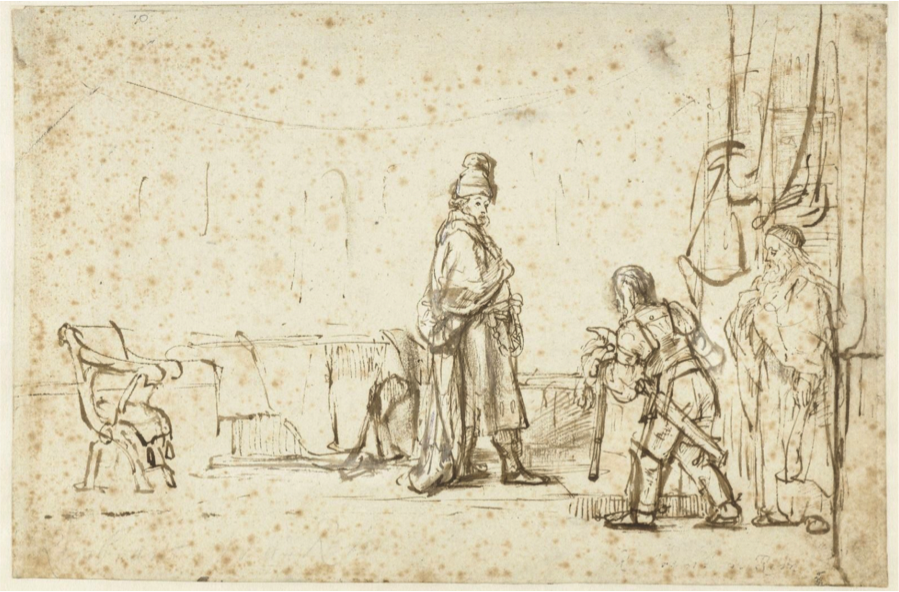1100 - 1000 BCE
King Saul and King David

David and Goliath from the Sistine Chapel by Michelangelo
Timeline of King David of Israel
- c. 1040 BCE David is born in the town of Bethlehem.
- c. 1035 BCE Saul begins his reign as King of Israel.
- c. 1025 BCE David slays Goliath, the Philistine.
- c. 1020 BCE King Saul attempts to assassinate David.
- c. 1010 BCE King Saul dies. David becomes King.
- c. 1004 BCE King David captures the Fortress Zion in Jerusalem, establishes Jerusalem as the capital of the Twelve Tribes of Israel, brings the Ark of the Covenant to Jerusalem
- c. 970 BCE King David dies.

David and Goliath, c. 1025 BCE
1 Samuel 17:50
“David triumphed over Goliath with a sling and a stone; without a sword in his hand he struck down the Philistine and killed him.”
City of David Megalim Institute, Courtesy of George Blumenthal and the Gol Family


Khirbet Qeiyafa: An Israelite Fortress in the Elah Valley
“Shaaraim” Meaning “Two Gates”
1 Samuel 17:52
Then the men of Israel and Judah charged forward with a shout and pursued the Philistines to the entrance of Gath and to the gates of Ekron. And the bodies of the Philistines were strewn along the Shaaraim road to Gath and Ekron.
Two city gates were found at Khirbet Qeiyafa in the Valley of Elah.
The Hague Museum, Netherlands
King Saul Attempts to Assassinate David,
c. 1020 BCE
1 Samuel 19:11
Saul sent messengers to David’s home to keep watch on him and to kill him in the morning. But David’s wife, Michal, told him, “Unless you run for your life tonight, you will be killed tomorrow.”
City of David Megalim Institute , Courtesy of George Blumenthal and the Gol Family

Why King David Chose Jerusalem as the Capital of Israel, c. 1004 BCE
City of David Megalim Institute, Courtesy of George Blumenthal and the Gol Family

City of David Excavations
King David’s Jerusalem
The City of David
1004 BCE

City of David Archives
King David’s Palace
2 Samuel 5:11
Now Hiram king of Tyre sent envoys to David, along with cedar logs, carpenters, and stonemasons, and they built a palace for David.
City of David Megalim Institute, Courtesy of George Blumenthal and the Gol Family

King David's Palace

Shalom Kveller, City of David
Drawing by Balage Balogh
King David by Rembrandt, Private Collection, Wikimedia Commons
Jewish History now introduces us to one of the most beloved figures
in the Bible, King David. The Bible describes him as follows: 1 Sam 13:14 “…the Lord has sought for Himself a man after His own heart,
and the Lord has appointed him to be a ruler over His people…”
With a difficult upbringing, David is assigned to be a lonely shepherd
looking after his father’s flock. Through this however, he learns valuable
lessons in caring for those in his fold. He further proves himself to be an
excellent poet and musician writing most of the spiritually infused Psalms,
still loved and read by millions around the world today, which merits him the
title “the sweet singer of Israel” in 2
Sam 23:1.
Protecting
his precious flock from the bear and the lion, David becomes a fearless and mighty
warrior in battle, forging a deep bond with G-d that ultimately merits him to
become the first anointed king over the tribal confederation of Israel. This is his story:
Let’s look at a timeline highlighting King David’s life:
1040 BCE David is born in the town of Bethlehem.
1035 BCE Saul begins his reign as King of Israel.
1025 BCE David slays Goliath, the Philistine.
1020 BCE King Saul attempts to assassinate David.
1010 BCE King Saul dies. David becomes King.
1004 BCE King David captures the Fortress of Zion in
Jerusalem, establishes Jerusalem as the capital of the Twelve Tribes of Israel
and brings the Ark of the Covenant to Jerusalem
970
BCE King David dies.
The Epic story of David and Goliath still resonates and inspires millions around the world - a story of the underestimated underdog that triumphs over an intimidating and domineering giant. Like all Biblical stories, this one comes alive in the land of Israel with archaeological finds enriching Biblical and historical context.
To appreciate this legendary tale, we turn our attention to Khirbet Qeiyafa: an Israelite fortress in the Valley of Elah, the valley where the historic confrontation between the Israelites and the Philistines took place.
Afterward,
King Saul relentlessly tries to hunt down David. Throughout these accounts,
David, driven by a deep moral compass, refuses to harm King Saul.
Watch
the Megalim Video courtesy of George Blumenthal and the Gol Family, to learn
more about this time in David’s life.
After King Saul and his son Jonathan, die in battle, the tribal leaders turn to David, who at that time already ruled for seven and a half years in Hebron. They appoint him as King over the united tribal confederation of Israel. King David immediately sets his sights on Jerusalem, one of the last cities that have yet to be taken during the Israelite conquest of the land. David chooses Jerusalem specifically for four main reasons: Water, Security, Unification and neutral ground rule, but more importantly, because of Jerusalem’s inherent holiness as the chosen place where the future Temple will be built. Watch the video to learn more behind David’s rational in taking the city.
In this picture is an artist’s rendition of the City of David, nestled between the Kidron and Tyropoeon Valley in the time of King David circa 1004 BCE
After King David conquered Jerusalem, he partnered with King Hiram
of Tyre to help him build his palace.
2 Samuel 5:11 Now Hiram king of Tyre sent envoys to David, along with cedar logs,
carpenters, and stonemasons, and they built a palace for David.
Later, King Hiram would also commit to King David’s son, Solomon,
assisting him in building the Temple and also his palace. Watch
the video by Megalim, courtesy of George Blumenthal and the Gol family to learn
more about the Palace of King David.
In this picture by Shalom Kveller, one can view the Palace’s location within the City of David.
created with
WordPress Website Builder .

